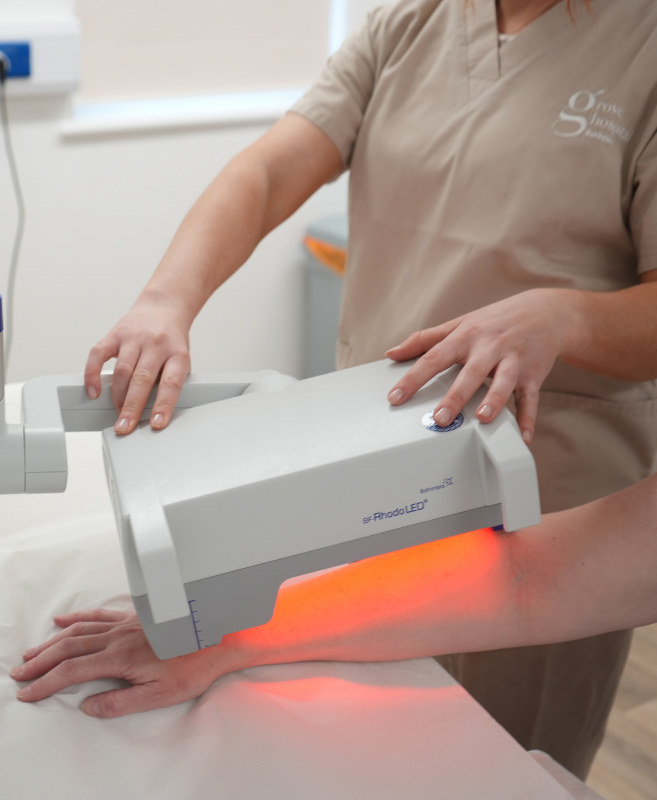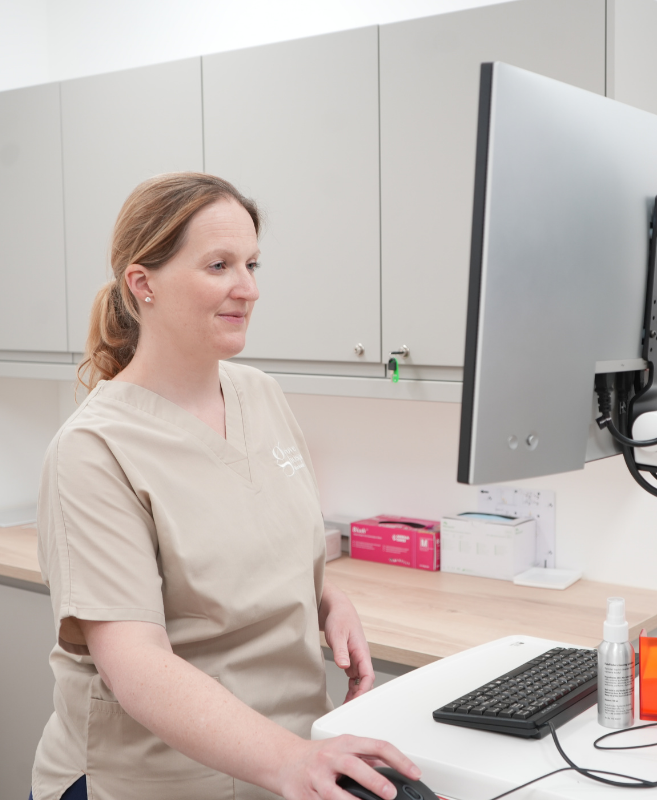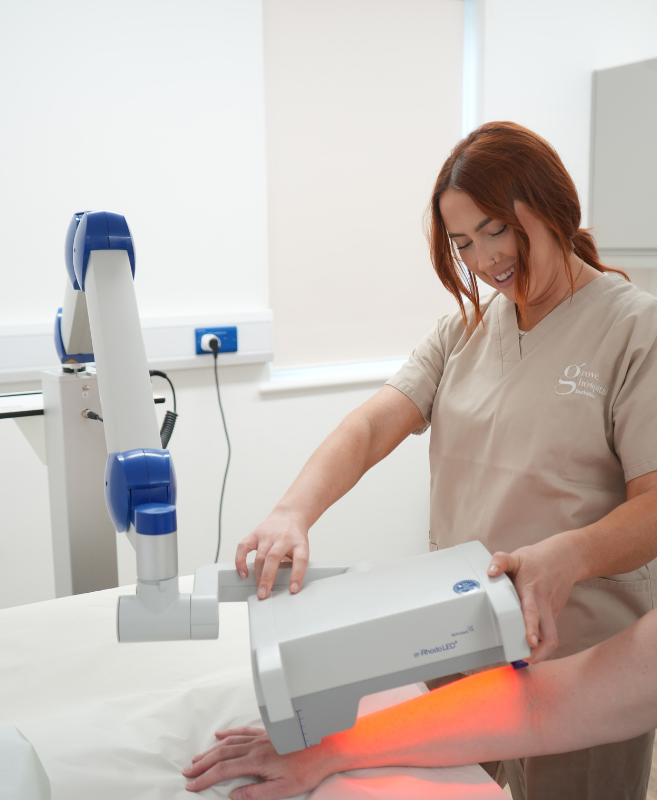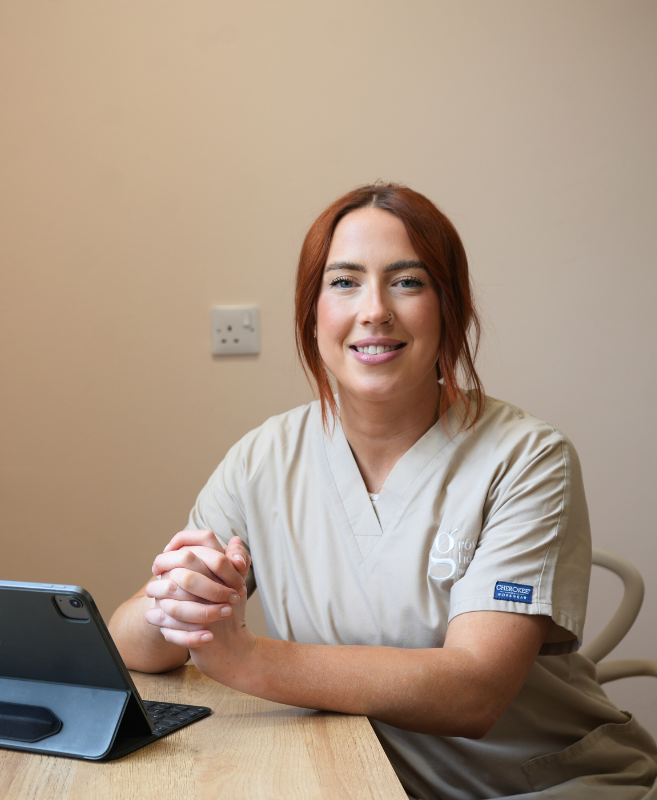Photodynamic Therapy (PDT) for Skin Cancer
A non-surgical treatment for certain skin cancers and pre-cancerous lesions using light-activated medicine.
What is Photodynamic Therapy?
Commonly referred to as: PDT, light therapy for skin cancer, non-surgical skin cancer treatment, red light treatment, actinic keratosis light therapy.
Photodynamic therapy (PDT) is a well-established non-surgical treatment for precancerous skin lesions and low risk skin cancers that is increasingly popular across the UK. It involves applying a special light-sensitizing gel to abnormal skin cells, which are then exposed to a targeted light source. This process selectively destroys damaged cells while leaving healthy tissue untouched.
PDT skin treatment is most often used for pre-cancerous lesions and superficial skin cancers, offering an effective solution without the need for cutting or stitching. At Apex Skin Clinic, our consultant skin cancer specialists and consultant dermatologists deliver photodynamic therapy UK patients can trust — providing safe, clinically effective care for a range of early skin cancers and cosmetic concerns.
Because photodynamic treatment preserves the surrounding skin and avoids scarring, it is especially suitable for visible areas such as the face, scalp and chest. It can also treat large areas at one time in a single session, providing efficient and effective treatment.
What Are The Benefits Of Photodynamic Therapy?
PDT skin treatment offers many advantages. It is completely non-invasive, with no incisions or stitches required. This makes it particularly beneficial for treating areas such as the face, scalp, chest and hands, where preserving the skin’s appearance is important.
Because photodynamic treatment targets only abnormal cells, it spares healthy tissue and minimises the risk of scarring. Patients can often have multiple lesions treated during a single session, improving efficiency and reducing overall treatment time.
PDT also provides a valuable option for patients who prefer not to undergo surgery, or who may not be suitable for surgery due to medical conditions. It is a well-established, effective treatment with excellent cosmetic outcomes for carefully selected skin cancers and pre-cancerous lesions.
-
Your consultant will carefully assess your skin to confirm that PDT skin treatment is appropriate. In some cases, a biopsy may be performed first to confirm the diagnosis. You will be provided with clear instructions on how to prepare for the procedure, and you will have the opportunity to ask any questions.
-
On the day of your photodynamic treatment, a photosensitising gel will be applied to the treatment area. You will be asked to wait for approximately two to three hours to allow the cream to fully absorb into the skin cells.
After this, you will return to the clinic where a specialised PDT light treatment for skin will be applied for 5 to 10 minutes. You may feel a warm, tingling or stinging sensation during this time, but any discomfort is temporary and can be managed with cooling airflow and short breaks.
-
In the days following PDT skin treatment, the treated area may become red, swollen and crusted. Over time, this will heal naturally as the skin renews. Full recovery generally takes between 2 and 4 weeks.
Your consultant will provide personalised aftercare instructions and will advise you to protect the area from sun exposure during the healing period. You will also be given guidance on moisturising the skin to promote recovery.
Our team will schedule a follow-up to monitor your progress and ensure you achieve the best possible outcome.
Who Should Consider Photodynamic Therapy?
If you have been wondering what is PDT skin treatment?, it is designed to treat pre-cancerous changes and early skin cancers on the skin’s surface. We most commonly use PDT light treatment for skin to manage actinic keratosis, Bowen’s disease (squamous cell carcinoma in situ), and superficial basal cell carcinoma (BCC) in patients where surgery may not be suitable or preferred.
Some patients are offered PDT skin treatment when surgery might affect cosmetic outcomes, or where multiple lesions need treating. The treatment is also occasionally used to rejuvenate sun-damaged skin and reduce inflammation in selected cases of acne. However, PDT is not appropriate for invasive cancers or large nodular BCCs, where surgical management remains the best option.
How Photodynamic Therapy Works
Photodynamic therapy works by applying a photosensitising gel directly to the treatment area. This cream is absorbed by abnormal skin cells, making them highly responsive to light. After a waiting period of around three hours, a controlled PDT light treatment for skin is performed using either red or day light, depending on the type of lesion being treated.
The light triggers a chemical reaction within the sensitised cells, causing them to break down naturally over the following days and weeks. The healthy surrounding skin remains unaffected.
As the skin heals, old damaged cells are replaced by new, healthy skin — leaving behind a clearer, smoother appearance. Because UK dermatology guidelines recommend this targeted approach, it helps patients avoid unnecessary surgery, particularly in cosmetically sensitive areas.
Frequently Asked Questions
-
Photodynamic therapy typically results in minimal or no scarring, especially when compared to surgery. It is often chosen for treating visible areas like the face or scalp, where cosmetic outcome is important.
-
Most patients feel some stinging, warmth, or burning during PDT light therapy, but this usually lasts only a few minutes. At Apex Skin Clinic, we use cooling and offer breaks during treatment to keep you comfortable.
-
Many lesions respond to just one session of photodynamic therapy. In some cases, particularly with thicker or more widespread lesions, a second treatment may be required after 1 to 2 weeks.
-
Following PDT skin cancer treatment, the area may become red, sore, or crusted for several days. This is a normal healing response. Most patients return to daily activities quickly, but sun exposure must be avoided during recovery.
-
PDT treatment is commonly used on the face, scalp, chest, and lower legs, particularly for actinic damage, Bowen’s disease, or superficial basal cell carcinoma. The skin is assessed thoroughly before treatment to confirm suitability.
-
Yes. Photodynamic therapy is available at Apex Skin Clinic Berkshire and Apex Skin Clinic London. Our team of dermatology experts and plastic surgeons offer PDT as a safe, effective treatment within a medically-led setting.
-
Photodynamic therapy cost in the UK varies depending on the lesion type and area treated. As a private dermatology clinic, we provide a personalised quote during consultation. We also assist with insurance queries where applicable.
-
Photodynamic therapy (PDT) is a non-invasive treatment for certain types of skin cancer and pre-cancerous lesions. It uses a light-sensitising gel applied to the affected area, followed by exposure to a special PDT light or sunlight. This creates a reaction to selectively destroy abnormal skin cells, while sparing surrounding healthy tissue.
-
Yes. PDT for skin cancer is highly effective for superficial basal cell carcinomas, Bowen’s disease, and actinic keratoses. UK studies support its use in treating early-stage lesions with excellent cosmetic outcomes. For deeper or more aggressive cancers, surgical excision remains the gold standard.
Apex Skin Clinic offers consultant-led photodynamic therapy for skin cancer and pre-cancerous lesions at our private dermatology clinic in Berkshire Grove Hospital, Maidenhead.
We welcome patients from Windsor, Eton, Marlow, Slough, Ascot, and throughout Berkshire, London and Surrey, seeking expert care and effective non-surgical skin cancer treatments.
Find Photodynamic Therapy Near You
Photodynamic Therapy at Berkshire Grove Hospital – Maidenhead, Windsor, Eton and Beyond
Apex Skin Clinic offers consultant-led photodynamic therapy for skin cancer and pre-cancerous lesions at our private dermatology clinic in Berkshire Grove Hospital, Maidenhead.
We welcome patients from Windsor, Eton, Marlow, Slough, Ascot, and throughout Berkshire, London and Surrey, seeking expert care and effective non-surgical skin cancer treatments.




